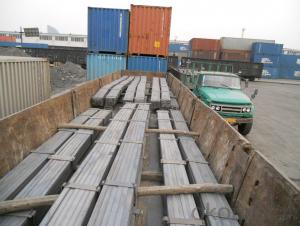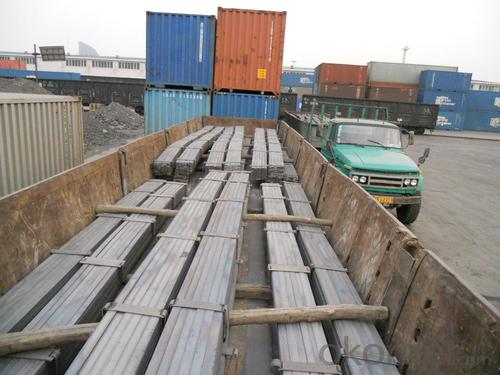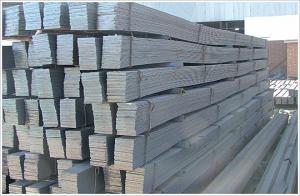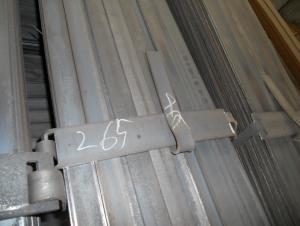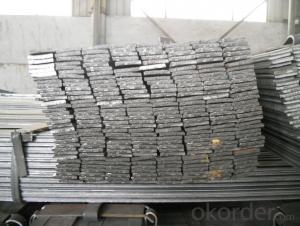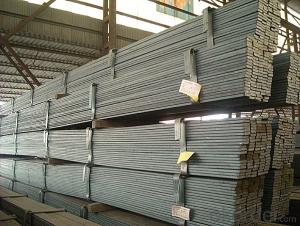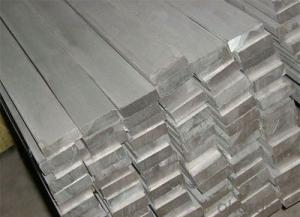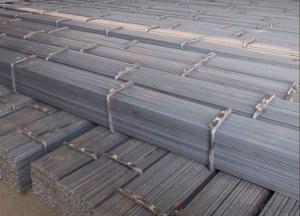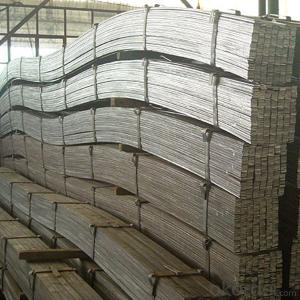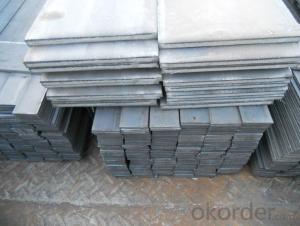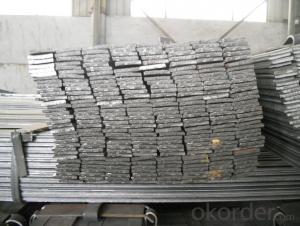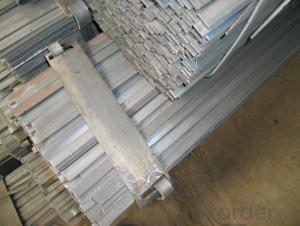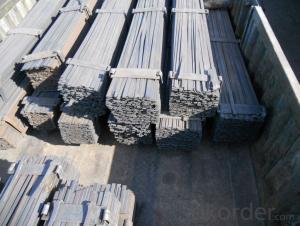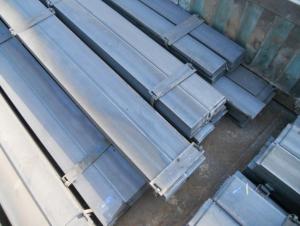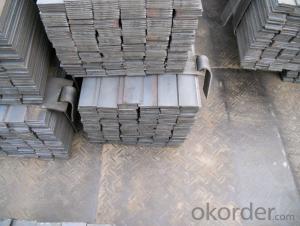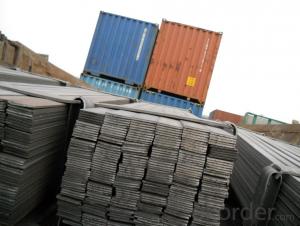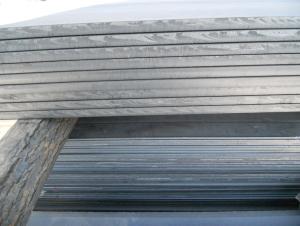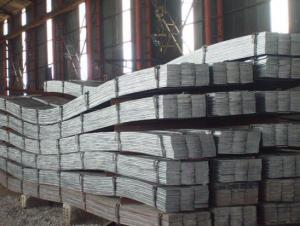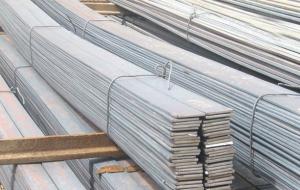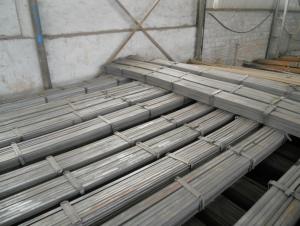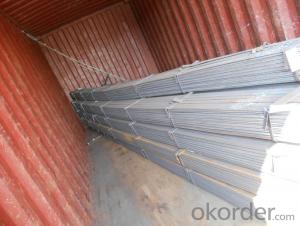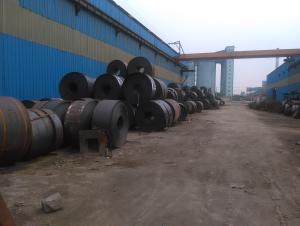GB Standard Steel Flat Bar with High Quality 25mm
- Loading Port:
- Tianjin
- Payment Terms:
- TT OR LC
- Min Order Qty:
- 25 m.t
- Supply Capability:
- 15000 m.t/month
OKorder Service Pledge
OKorder Financial Service
You Might Also Like
Product Description of GB Standard Steel Flat Bar with High Quality 25mm:
Specification of GB Standard Steel Flat Bar with High Quality 25mm:
-Standard: GB
-Material: Q235
-Length: 6m, 12m
-Size:
| Size(mm) | Mass(Kg/m) |
| 25*5 | 0.98 |
| 25*8 | 1.57 |
| 25*10 | 1.96 |
Package & Delivery of GB Standard Steel Flat Bar with High Quality 25mm:
1.The steel flat bars will be packed in bundle with steel wire at each end of every bundle and color marking in order to help the customer to recognize his goods more easily at sight.
2. And the steel flat bars could be loaded into 20ft or 40ft container, or by bulk cargo. If the weight of each bundle reaches more than 3.5 mt, the loading by break bulk cargo should be choosed. When the weight of each bundle reaches less than 3mt, the loading by container should be choosed.
3.As for the transportaion from mill to loading port, the truck will be usually used. And the maximum quantity for each truck is 40mt.
4.All in all, we could do in accordance with customer's request.
FAQ:
Q1: Why buy Materials & Equipment from OKorder.com?
A1: All products offered by OKorder.com are carefully selected from China's most reliable manufacturing enterprises. Through its ISO certifications, OKorder.com adheres to the highest standards and a commitment to supply chain safety and customer satisfaction.
Q2: How do we guarantee the quality of our products?
A2: We have established an advanced quality management system which conducts strict quality tests at every step, from raw materials to the final product. At the same time, we provide extensive follow-up service assurances as required.
Q3: How soon can we receive the product after purchase?
A3: Within three days of placing an order, we will arrange production. The shipping date is dependent upon the quatity, how many sizes you want and the plan of production, but is typically 1 month to 2 month days from the beginning of production.
Images of GB Standard Steel Flat Bar with High Quality 25mm:
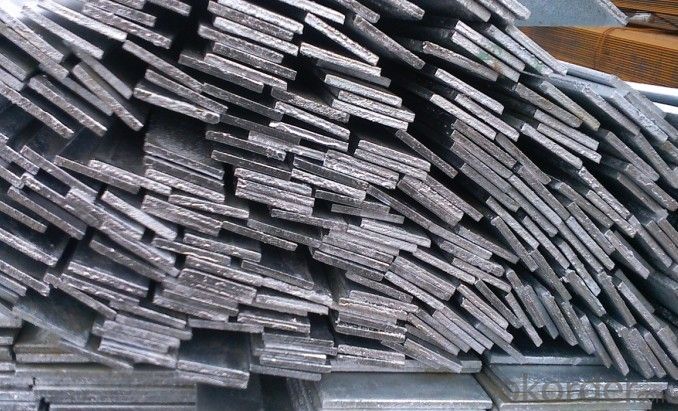
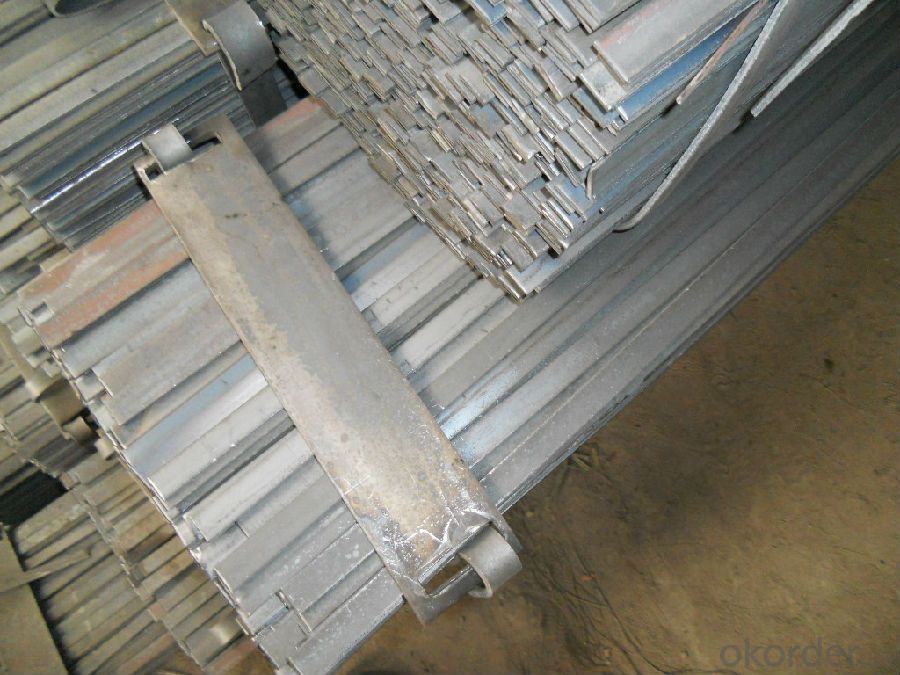
*If you would like to get our price, please inform us the size, standard/material and quantity. Thank you very much for your attention.
- Q: Are steel flat bars suitable for the construction of cultural or arts venues?
- The construction of cultural or arts venues can indeed make use of steel flat bars. Steel is a versatile and durable material with various architectural applications. It offers several advantages that make it an ideal option for cultural or arts venues. To begin with, steel flat bars provide excellent structural support. They possess high tensile strength and can bear heavy loads, making them suitable for constructing large and complex structures like theaters, concert halls, or art galleries. Steel's strength-to-weight ratio is also beneficial, allowing for the creation of spacious and open designs without compromising stability. Moreover, steel flat bars offer design flexibility. They can be easily shaped, bent, or welded to create intricate and artistic structures. This allows architects and designers to incorporate unique and visually appealing elements into their designs, enhancing the aesthetic appeal of cultural or arts venues. Additionally, steel is a sustainable building material. It is highly recyclable, and its production process consumes less energy compared to other construction materials. This makes steel flat bars an environmentally friendly choice, aligning with the growing emphasis on sustainable construction practices. Furthermore, steel's durability ensures that cultural or arts venues constructed with steel flat bars will have a long lifespan. Steel is resistant to corrosion, fire, and pests, reducing maintenance and repair costs over time. This durability makes it a reliable choice for venues that are expected to withstand heavy foot traffic and frequent usage. In conclusion, steel flat bars are indeed suitable for the construction of cultural or arts venues. Their strength, design flexibility, sustainability, and durability make them a popular choice among architects and developers. By utilizing steel, cultural or arts venues can be built to withstand the demands of artistic performances and exhibitions while also providing aesthetically pleasing and sustainable spaces for the public to enjoy.
- Q: What are the different types of surface treatments for steel flat bars?
- There are several different types of surface treatments available for steel flat bars, each serving a specific purpose and providing unique benefits. Some of the common surface treatments for steel flat bars include: 1. Hot-dip galvanizing: This process involves immersing the steel flat bar in a bath of molten zinc, which forms a protective layer on the surface. Hot-dip galvanizing provides excellent corrosion resistance and durability, making it suitable for outdoor applications. 2. Powder coating: Powder coating involves applying a dry powder to the steel flat bar's surface and then curing it with heat. This process creates a tough and durable finish that is resistant to chipping, scratching, and fading. Powder coating is available in a wide range of colors and can enhance the aesthetic appeal of the steel flat bar. 3. Electroplating: Electroplating is a process where a thin layer of metal, such as chrome, nickel, or zinc, is deposited onto the steel flat bar's surface through an electrochemical reaction. This treatment improves corrosion resistance, enhances appearance, and can provide specific functional properties based on the chosen metal. 4. Paint coating: Applying a paint coating to the steel flat bar's surface provides both protection and aesthetics. Paint coatings can be customized to meet specific requirements and are available in various types such as epoxy, polyurethane, and acrylic. They offer good corrosion resistance and can be reapplied when necessary. 5. Anodizing: Anodizing is primarily used for aluminum, but it can also be applied to steel. The process involves creating an oxide layer on the surface of the steel flat bar through an electrolytic process. Anodizing enhances corrosion resistance and can be combined with coloring techniques to provide a decorative finish. 6. Phosphating: Phosphating is a chemical treatment that converts the steel flat bar's surface into a layer of phosphate crystals. This process improves corrosion resistance, provides an excellent base for subsequent coatings or paints, and enhances the adhesion of lubricants. 7. Shot blasting: Shot blasting is a mechanical surface treatment that involves propelling abrasive particles at high speeds onto the steel flat bar's surface. It removes impurities, rust, scale, and creates a textured finish, improving the adhesion of subsequent coatings. Each of these surface treatments offers distinct advantages and should be chosen based on the specific requirements of the steel flat bar's intended application, the desired appearance, and the level of corrosion resistance needed.
- Q: Can steel flat bars be used for making brackets or supports for agricultural machinery?
- Yes, steel flat bars can be used for making brackets or supports for agricultural machinery. Steel is a durable and strong material, making it suitable for providing the necessary support and stability required in agricultural machinery. Additionally, steel is resistant to corrosion, which is crucial in agricultural environments that are often exposed to moisture and harsh weather conditions.
- Q: How do you straighten a bent steel flat bar?
- To straighten a bent steel flat bar, you will need a few tools and some patience. Here are the steps you can follow: 1. Assess the bend: Determine the severity of the bend and the area affected. This will help you decide on the appropriate method and tools to use. 2. Apply heat: If the bar is not too thick, you can use heat to help straighten it. Heat the bent area using a blowtorch or a heat gun until it becomes red-hot. This will make the steel more malleable and easier to work with. 3. Use a vice: Clamp the bar securely in a vice, making sure to position it in a way that allows you to work on the bent area. The vice will provide the necessary stability for straightening. 4. Apply pressure: Using a hammer or a mallet, gently tap the bent area in the opposite direction of the bend. Start from the outside edges and work your way towards the center. Apply controlled and consistent pressure, making sure not to strike too hard, as it could damage the bar or create new bends. 5. Check progress: After each strike, release the bar from the vice and inspect the bend. If it is straightening out, continue with the process. If not, re-apply heat and try again. 6. Repeat if necessary: Depending on the severity of the bend, you may need to repeat steps 2 to 5 several times. Take your time and be patient, as rushing the process can lead to further damage. 7. Cool down: Once the bar is straightened to your satisfaction, allow it to cool down naturally or use water to cool it more quickly. This will help set the steel in its new shape. 8. Test for straightness: After cooling, check the bar's straightness by placing it on a flat surface. If it still has slight bends, you can repeat the process or use a straightening jig or press for more precise adjustments. Remember, working with metal can be dangerous, so always wear appropriate protective gear, such as gloves and safety glasses. If you are unsure about the process or lack the necessary tools, it is advisable to seek professional help to avoid any accidents or further damage.
- Q: What are the different grades of steel used in flat bars?
- There are several different grades of steel that are commonly used in flat bars, each with its own specific properties and applications. Some of the most common grades include: 1. Mild Steel (also known as low carbon steel): This is the most widely used grade of steel in flat bars. It has a relatively low carbon content, which makes it easy to work with and provides good weldability. Mild steel is commonly used in construction, automotive, and general fabrication applications. 2. Carbon Steel: This grade of steel has a higher carbon content than mild steel, typically ranging from 0.30% to 2.0%. Carbon steel offers increased strength and hardness compared to mild steel, making it suitable for applications that require higher load-bearing capabilities, such as machinery parts and structural components. 3. Alloy Steel: Alloy steel is a type of steel that contains additional elements such as manganese, silicon, nickel, chromium, or molybdenum. These alloying elements enhance the mechanical properties of the steel, including its strength, hardness, and corrosion resistance. Alloy steel flat bars are commonly used in the manufacturing of tools, gears, and machine parts. 4. Stainless Steel: Stainless steel is a corrosion-resistant grade of steel that contains a minimum of 10.5% chromium. It offers excellent resistance to rust, staining, and corrosion, making it ideal for applications in harsh environments or where hygiene is crucial, such as food processing, pharmaceuticals, and marine applications. Stainless steel flat bars are available in various grades, with the most common ones being 304 and 316. 5. Tool Steel: Tool steel is a specialized grade of steel that is designed to exhibit exceptional hardness, toughness, and wear resistance. It is commonly used in the manufacturing of cutting tools, molds, and dies. Tool steel flat bars are available in different grades, such as A2, D2, and O1, each offering specific properties suited for different applications. It's worth noting that these are just a few examples of the different grades of steel used in flat bars. There are many other specialized grades available for specific applications, such as heat-resistant steel, wear-resistant steel, and high-strength steel, among others. The choice of grade depends on the specific requirements of the application in terms of strength, corrosion resistance, hardness, and other properties.
- Q: How do you prevent burrs or sharp edges on steel flat bars during cutting?
- One way to prevent burrs or sharp edges on steel flat bars during cutting is to use a high-quality cutting tool or blade with sharp edges. Additionally, using a slower cutting speed and applying consistent pressure can help minimize the formation of burrs. Another effective method is to use cutting lubricants or coolant, which can reduce friction and heat during the cutting process, resulting in smoother edges. Regular maintenance and periodic sharpening of cutting tools are also crucial in preventing burrs and maintaining clean cuts.
- Q: Can steel flat bars be used for making hinges or latches?
- Indeed, hinges or latches can be crafted using steel flat bars. The utilization of steel flat bars is widespread in diverse contexts owing to their robustness, endurance, and adaptability. In the realm of hinges or latches, they furnish a dependable and robust mechanism for the act of opening and closing doors, cabinets, or other objects. The flat structure of these bars facilitates effortless installation and secure fastening to the respective surfaces. Moreover, steel boasts remarkable resistance to corrosion, rendering it suitable for employment both indoors and outdoors. In summary, the utilization of steel flat bars for fabricating hinges or latches is an exceptional choice, as it imparts stability and durability to the final product.
- Q: How do you prevent scaling or oxidation on steel flat bars during heat treatment?
- To prevent scaling or oxidation on steel flat bars during heat treatment, a common approach is to use a protective atmosphere or medium such as nitrogen or controlled atmosphere furnaces. Additionally, applying a coating or using stainless steel or heat-resistant alloys can help prevent scaling or oxidation. Employing proper handling techniques, such as avoiding exposure to moisture or corrosive substances, can also contribute to minimizing scaling or oxidation during heat treatment.
- Q: Can steel flat bars be used in the food industry?
- In the food industry, there are certain factors to consider when using steel flat bars. Steel is a versatile and durable material that can be used in various applications, including the food industry. However, it is important to use food-grade or stainless steel to meet hygiene and safety standards. Food-grade stainless steel is commonly used in the food industry because it is resistant to corrosion, easy to clean, and can withstand high temperatures. It does not react with food or affect its taste, making it perfect for food preparation surfaces, countertops, and equipment. Steel flat bars can be used in the food industry for different purposes, such as constructing food processing equipment, creating worktables, shelves, and racks, or as a structural component in food packaging machinery. However, it is crucial to ensure that the steel used complies with food safety regulations and guidelines, like those set by the Food and Drug Administration (FDA) or the European Food Safety Authority (EFSA). Regular steel flat bars, not specifically designed for the food industry, may not meet the required cleanliness and hygiene standards. These bars might contain impurities, such as rust or contaminants, that could contaminate the food or compromise its safety. Therefore, when considering the use of steel flat bars in the food industry, it is essential to choose food-grade stainless steel that is specifically manufactured for such applications. This will ensure that the steel is safe, durable, and suitable for use in food processing, handling, and preparation areas.
- Q: What is the maximum thickness-to-width ratio for steel flat bars?
- The maximum thickness-to-width ratio of steel flat bars can differ depending on the particular grade and type of steel employed. Nonetheless, typically, the maximum thickness-to-width ratio for steel flat bars is approximately 1:10. This implies that the bar's thickness should not surpass 10 times its width. It is crucial to acknowledge that this ratio might change according to the specific application and industry regulations. Thus, it is advisable to consult relevant engineering codes and standards to establish the maximum thickness-to-width ratio for a specific steel flat bar.
Send your message to us
GB Standard Steel Flat Bar with High Quality 25mm
- Loading Port:
- Tianjin
- Payment Terms:
- TT OR LC
- Min Order Qty:
- 25 m.t
- Supply Capability:
- 15000 m.t/month
OKorder Service Pledge
OKorder Financial Service
Similar products
Hot products
Hot Searches
Related keywords
